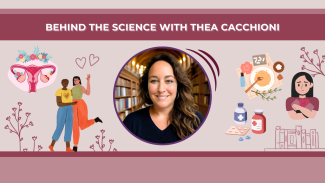Interviewee: Dr. Thea Cacchioni | Authors/Editors: Romina Garcia de leon, Janielle Richards (Blog Co-coordinators)
Published: August 2, 2024
Can you tell us about your research?
My original research area critically engaged the diagnostic category of female sexual dysfunction. I was concerned that women's problems were being over-medicalized. This was in the wake of Viagra, and there was a race among pharmaceutical companies to find a Viagra-like drug for women. Whereas Viagra was a drug that was discovered ‘accidentally’, every option tested for women was ineffective. In the meantime, scientists and doctors connected to the pharmaceutical industry were discussing how to define women’s sexual problems, particularly given that frigidity was no longer seen as an acceptable term. As part of this research area, I interviewed women with sexual problems – I heard of some physiological reasons for difficulties, particularly in the case of sexual pain, but interpersonal, social and political reasons were overwhelmingly more common (such as past experiences of sexualized violence, partner dissatisfaction, and so on). It was also clear that there was a lot of misunderstanding around what constitutes ‘normal.’ I also testified at the US FDA against one particular desire drug that was denied twice and then eventually approved after a very clever public relations campaign accusing the FDA of sexism.
A more recent area of research that is more personal to me is Polycystic Ovarian Syndrome (PCOS). As a gender studies professor, I find it to be quite fascinating that 4-10% of women globally have this diagnosis, yet there is such little public discussion about it. This is an area that is also of interest given that it’s related to the standards of femininity and successful heterosexuality in ways that are similar to my past area of research. PCOS includes symptoms such as hairiness, acne, infertility, and weight gain. These are all things that do not fall into a hetero-feminine norm. My research in PCOS involves doing in-depth interviews with individuals with PCOS. An interesting aspect of this sample is that out of 30, 15 people identify as queer, with 5 identifying as non-binary or trans. I’m interested in the way that experiences of PCOS may differ depending on gender and sexual identity.
What led you to do this work?
I have lived experiences with PCOS. I've had the diagnosis for over 20 years, and I'm very familiar with how difficult it is to engage with medical professionals around this diagnosis. There's a lot of misunderstanding or lack of awareness within the medical community, and that was part of my interest. My PCOS symptoms are mainly weight gain, irregular menstruation, and struggles with fertility. On top of this, I had an added distress because I felt like I wasn't being a ‘good feminist’ for worrying about these things. This interested me. I think trends, theory and politics have helped me come to terms with this dichotomy I was experiencing. I also think that I've come further into body acceptance through body-positive movements that we're seeing through fat activism.
Could you share any findings from your research?
One finding that I continue to see in the PCOS participants is that non-binary people show fewer signs of distress towards their symptoms and embrace them as part of their gender identity. I think the queer sample overall, had a lot more support in their relationships in terms of embodying these traits. There is less pressure in terms of fertility, and thinness, as well as acceptance of acne or weight gain. That’s not to say that you can't be queer and feminine-identified or concerned with fertility or weight gain, of course. Another trend that I noticed was that distress over these symptoms was a sense of feminist consciousness (which I saw in both heterosexual and queer samples). Individuals with a positive relationship with their bodies because of their feminist consciousness had less symptom-related distress. In terms of their experiences with the medical system - most of them had pretty terrible experiences with doctors who would simply tell them to lose weight. However, it’s very hard to lose weight when you have PCOS.
Another noticeable observation was that a lot of PCOS patients sought naturopathic remedies. This may be driven by the lack of support from their doctors. In sessions with naturopaths they can converse about their symptoms for longer periods and feel heard. A lot of people are turning to holistic medicine, and I think that's something the medical profession has to address. In general, we see frustration with medicine, a tendency to rely on advice from naturopaths and influencers and so-called hormone experts. I think that it gives individuals a sense of control. Yet many times, these individuals will prescribe many supplements that have very little results.
Where do you hope this research will go in a couple of years?
I would love to expand my research to diverse people with PCOS. Although my study was diverse and had some diversity in terms of gender identity, I would like to take that further. I would also like to look into the question of race, ethnicity, nationality, culture, religion, and how that may influence your experiences with PCOS. All of these factors may shape norms of sex, gender, and sexuality, all of which come into play when discussing PCOS and distress.
For instance, another problem with the medical approach is that it’s very connected to the body mass index (BMI). There are a lot of critiques of the BMI, and so I think that also that's another point around where people with PCOS are losing proper care, because if it's just centred on BMI, it can be misleading - you can be very muscular with PCOS and not fit within a healthy weight on the BMI.
Where to read more about Dr. Cacchioni’s work?
